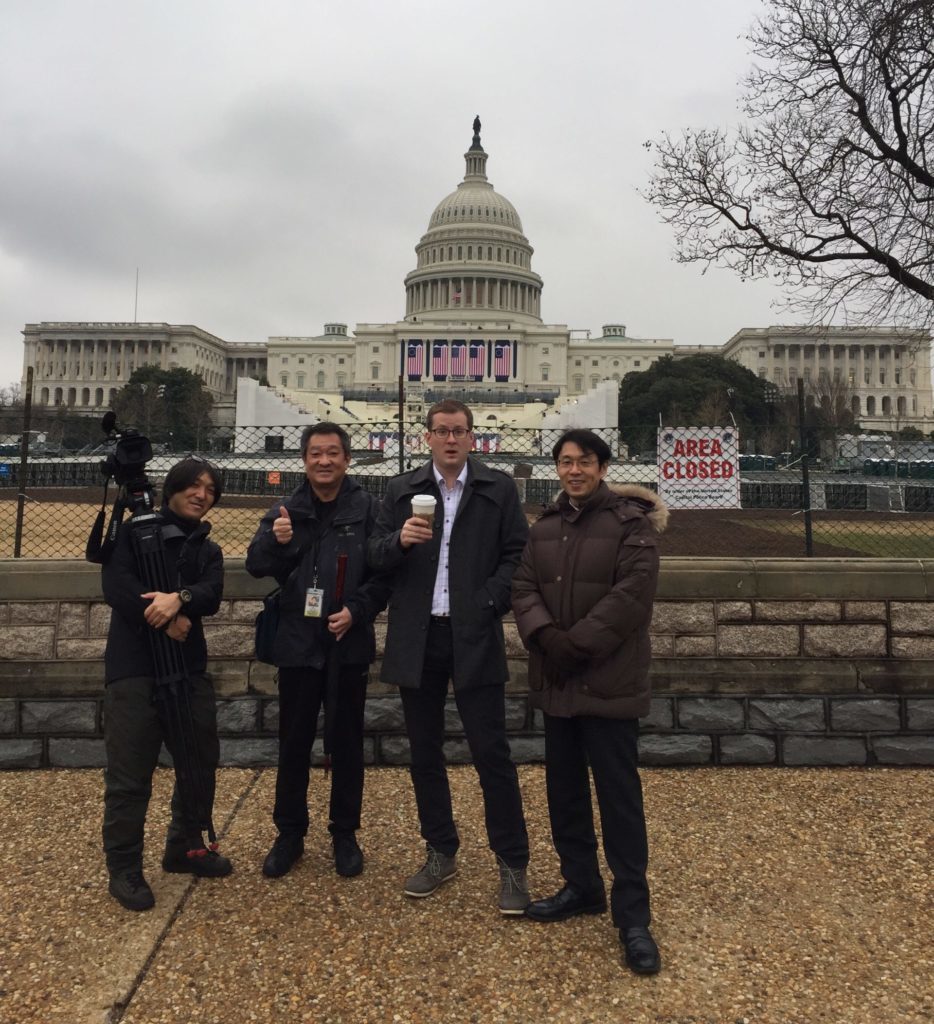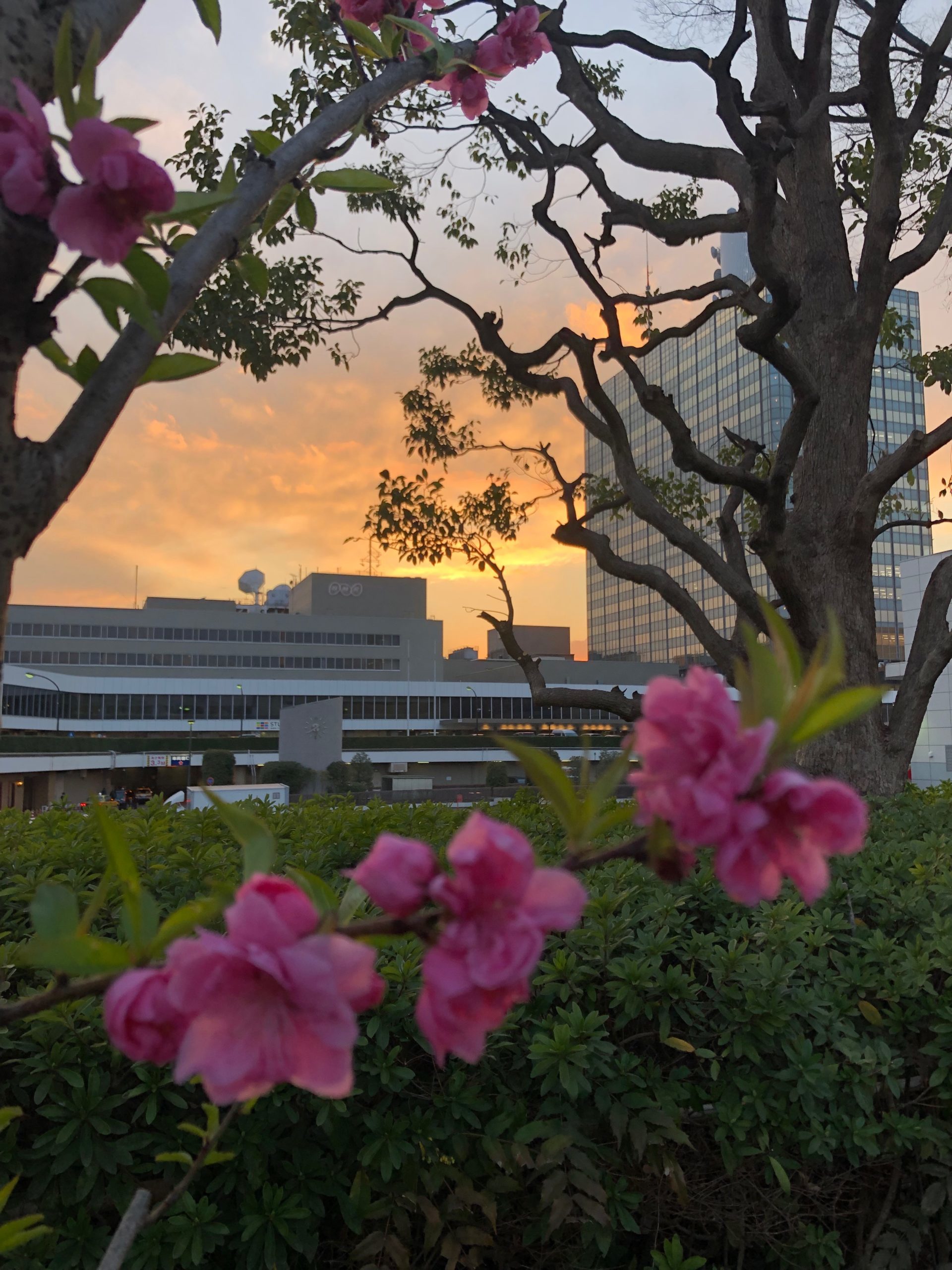Over three and a half years, Adam Walsh helped field-produce the inauguration of the United States president in D.C. and the first inter-Korean summit between Kim Jong Un and Moon Jae-in. He got to speak with a survivor of the Nagasaki atomic bombing, as well as accompany a mother and daughter into the Fukushima exclusion area to visit their abandoned home.
The St. John’s-based CBC journalist had departed from his base in December of 2015 for the Tokyo offices of Japan’s NHK as part of a placement program between the two public broadcasters that goes back two decades.
When the NHK program began around 2000, a single CBC journalist would be hired on a temporary contract, with CBC granting the employee a leave of absence and with the promise that their job would still be there when they returned from Japan.
Since then, typically two CBC journalists — currently including Elyse Skura and Katie Starr of Ottawa — are at the NHK at any given time and many stay on for more than two years.
This relationship is the only one of its kind at CBC, according to CBC News.
Over the years, many news organizations have dismantled the majority of their international bureaus outside of Europe and the Middle East, and have begun relying increasingly on wire services. Occasionally editors dispatch reporters overseas to cover major events or global crises.
Given this shift and the problems associated with parachute journalism (lack of knowledge of the region and a lack of investment in communities being covered), partnerships such as this one offer a way for local newsrooms to maintain a longer-term presence abroad.
The Canadian public broadcaster doesn’t currently have a Japan bureau, so having journalists at the NHK is a way to cover breaking news by treating the overseas CBC journalists as freelancers.
An estimated 12 to 15 CBC staff have gone through the NHK World program.
After going through a selection process, Walsh joined the team at Newsline, an international English program that’s part of NHK World-Japan.
“The show would normally be the top stories in the world with an Asia-Pacific focus, and sometimes with a Japanese lens for certain things,” Walsh explained. It could cover anything from trade disputes between Japan and South Korea to cherry blossoms in bloom.
The chance to work at another broadcaster on the other side of the world is increasingly rare in the field of journalism. Walsh spoke to J-Source about some of the experiences and observations he made during his time at the NHK, such as learning about a different style of journalism.
Playing office politics
Walsh soon learned that office politics would play a major role in his new job.
The staff in the newsroom, for example, was always rotating, including the three editors-in-chief, “And so if you don’t have a perfect alignment, the day could get a little more difficult for you in terms of the difference in culture.”
There were instances when Walsh wanted to change something in a script but had to pick and choose his battles, especially regarding contentious stories.
Depending on who was in charge, he’d know the editor’s preferences so he could appeal to them. Sometimes Walsh would also weigh the issue and consider if it was big enough that he wanted to spend his hard-earned political capital to try for the change.
It required him to figure out how to navigate those new dynamics. “You have to learn it and understand it and read the room so much more than you ever do in a North American newsroom.”
There’s also “sontaku” to consider. It literally means “surmise,” or to act in a way you assume your superiors prefer. Walsh described it as self-censorship: “It’s like when you’re in a lower position and you’re trying to impress or please people higher than you or more powerful,” he said.
“You read between the lines and take a course of action which you think will keep them happy or keep them from being upset, even though nothing’s ever been said.” It created a cautious atmosphere in the newsroom, he explained.
Part of Walsh’s job included going over the scripts for the upcoming program, which were often translations of a Japanese script that had been used for a domestic audience. “So my job was to kind of advise and say: ‘Hey, maybe we should add some extra context here and maybe we should change this around to make it more understandable in English,’” for example.
For instance, there was an issue when it came to covering the abdication of Emperor Akihito. Walsh’s NHK colleagues didn’t want to use the word “abdicate” because in Japanese, it can mean the person died. Walsh pointed out that wasn’t an issue for an English-speaking audience and that other news organizations were using the word. However, his colleagues wouldn’t budge and in the end it was reported as, “the first time in 200 years for an emperor to choose to relinquish the throne.”
An interview is a promise
Walsh also found himself having to adjust to his colleagues’ approach to interviews. While in Canada, if he’d recorded an interview and it didn’t make it to air, he might feel bad over not being able to use the material. “It’s just the difference is that here, I won’t use it. And there, it will be used.” In Tokyo, if you’d interviewed someone, you’d made a promise to air it even if it didn’t contribute to the story.
The newsroom Walsh was in also had a different stance on mistakes. As soon as an error was caught, there would be an on-air apology and correction, like if a name was spelled incorrectly.
He saw there was a willingness to admit mistakes and make corrections, which can be positive, but Walsh noted that transparency didn’t always carry through to other issues.
“You would sometimes have sensitive stories that would lack context on purpose because the newsroom wouldn’t want to get into the context because it might be embarrassing, like a historical issue about World War II.”
For instance, there is still tension between South Korean and Japan stemming from Japan’s occupation during the 20th century.
“And again, that’s the culture. You’re in a very different culture and how things operate is not how things operate where you’re from. And my job was to advise and listen and try to understand, and to be respectful.”
All the while, Walsh had to balance his own set of values and argue his own points.

Back at the CBC St. John’s bureau since last summer, he considers his time at NHK an invaluable experience. “It is something that you will never forget and it can help you grow, but for each person it’s different, too.”
In those years abroad he had the experience of covering major international news, “That was my dream … To go to the inauguration for the president of the United States or to go up around an exclusion zone around the Fukushima Daiichi nuclear reactor, that’s wild. In a way, it doesn’t get better than that,” he said.
While his time at the NHK was a fascinating opportunity to see how journalism is done in other places, “I’m very happy that we have the journalism we have in Canada.”
“And it’s made me appreciate things at home a lot more and it’s also given me just this energy … go back at it again and I’m very excited about that.”

